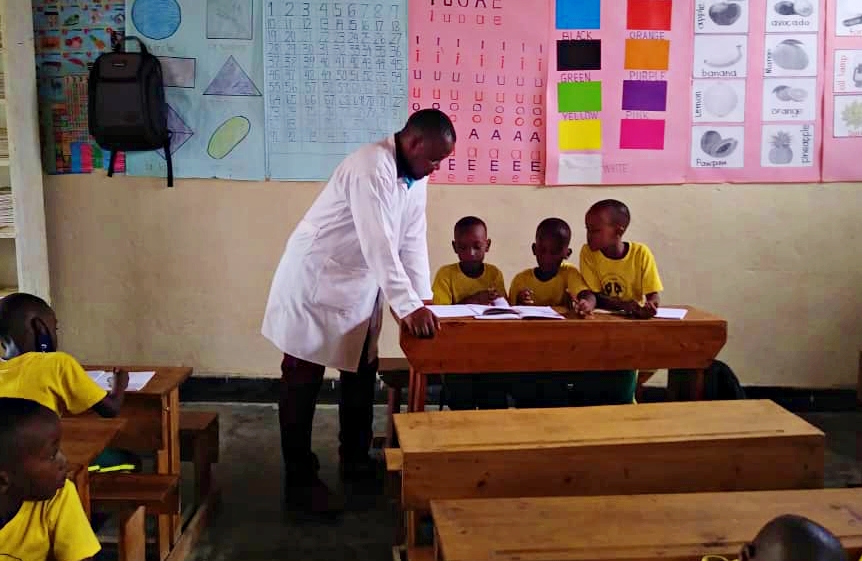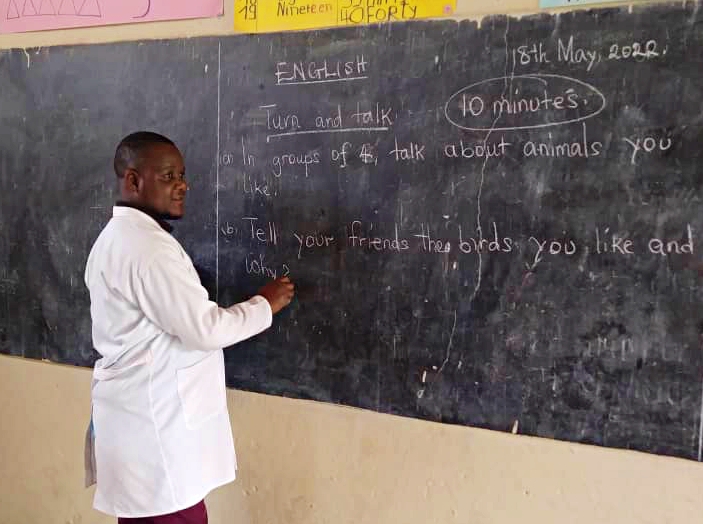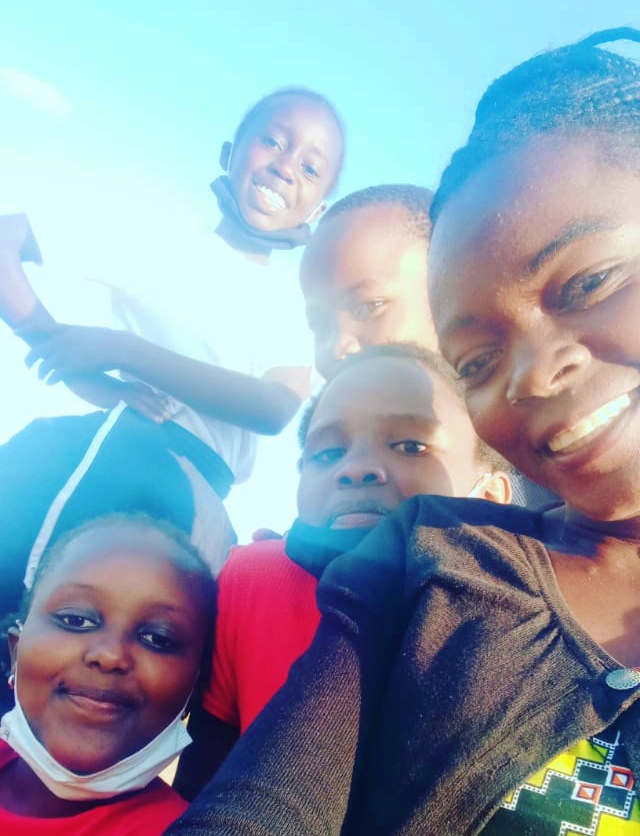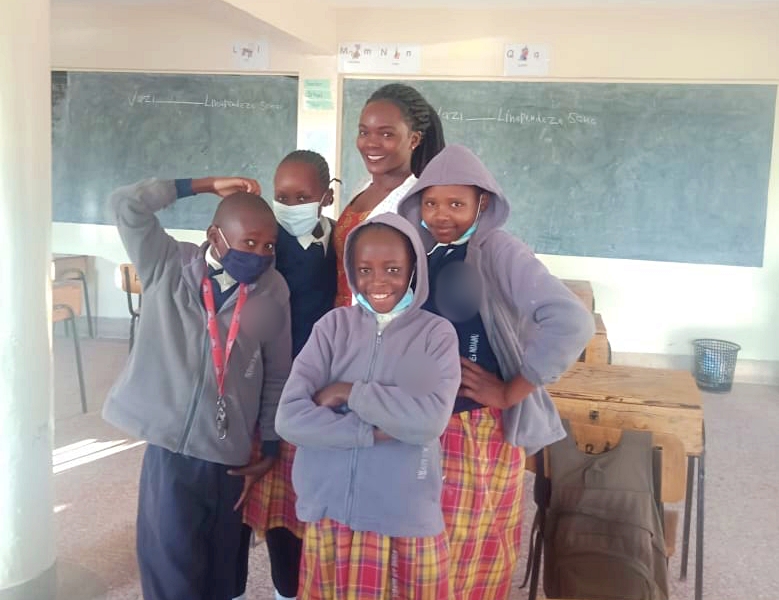What are Teacher Mentors saying after a year of Professional Development?

Ongoing professional development is critical to many careers, including teaching. And yet for many school leaders and teachers in the affordable non-state schools Opportunity EduFinance partners with, opportunities for ongoing professional development are limited.
Research has found that interventions addressing teacher pedagogy and classroom instruction through teacher professional development and coaching shows evidence of improved student learning.[1] The EduQuality program of Opportunity EduFinance has just completed its first year implementing a training-of-trainers Teacher Mentor model within the broader EduQuality program framework.
The Teacher Mentor model works to identify and equip mentors to train their peer teachers through professional development sessions and ongoing coaching, focusing on classroom management, teaching and learning and literacy.
The program’s aim is two-fold:
- to deliver training and coaching on teaching techniques aimed to positively impact student learning,
- to enable schools to institutionalize their own systems for ongoing professional development of teachers, ensuring sustained impact beyond the three-year EduQuality program.
To hear more about their experiences firsthand, we had a discussion with two Teacher Mentors who have just completed the first year of professional development training.
- Nicholas Tayebwa, School Leader & Teacher Mentor, Busy Bees Foundation School, Rwanda
- Yvonne Ochieng, School Leader & Teacher Mentor for Early Bird Primary School, Kenya
Why did you want to be a teacher mentor?
Nicholas: To begin with I want to thank Opportunity EduFinance for this program. At school we held a meeting and they selected three teachers who could learn from this program.
Yvonne: I wanted to join the teacher mentor program to improve on my teaching skills and to learn new skills in how to make learning effective in the classroom.
What were some of your key learnings from the first year of the program?
Nicholas: We learnt methods of engaging all learners in a lesson, and then we learnt positive instructions and positive behavior management.
We learnt some techniques including ‘cold call’ whereby the teacher has the name of their students in a small box and tells them ‘You are going to answer a question but don’t put up your hands’. Then they ask a question and gives the students time to think about it before cold calling a student to answer the question. Everyone is ready to answer because they don’t know who will be called on.
Another technique is ‘Turn and talk’ – the teacher gives a question and then the time they should spend discussing it with their neighbor, so they talk together while the teacher moves around the room and facilitates.
Yvonne: We learnt about engaging all learners in learnings and we learnt strategies to ensure that there is active learning in the classroom. The two strategies ‘cold call’ and ‘turn and talk’ have really helped me to check on learners’ ability and encourage those who do not want to raise their hands. We use these strategies in school and it really helps learners to discuss learning outcomes and carry out our CBC [the new competence-based curriculum in Kenya]. These strategies really help to check understanding and for learners to continue learning new information from their peers.

How have you found delivering what you’ve learnt to the other teachers in your school?
Nicholas: The training in my school went very well as we could ask our facilitators to help us if we had forgotten anything. We delivered the same content that they taught us already to the rest of the teachers.
Initially the teachers said they had already been having very many trainings, but then when we trained them they said it has helped them so much because they are engaging all learners. The lessons have become more active than before.
Yvonne: We have had session with other teachers after every time we have a teacher mentor training. Once we learn a strategy there, we come and share it with other teachers and as a result we have really improved on discipline and the level of the learners.
They are very positive about the program and they want to find out more about Teacher Mentor Professional Development. We have just started doing coaching conversations where we discuss how the strategies are working in their classrooms.
How have you felt being a trainer in your school?
Yvonne: It was good because it helped to improve my confidence teaching other teachers as we have a session and then discuss questions. When are you a teacher mentor you have to understand that you will lead others. You have to explain what it is about and how we conduct ourselves in school. I find most of the teachers I train also want to join the program.

What are you hoping to learn in the second year?
Nicholas: I’m hoping to learn different things like the way we learnt the first module, and I hope in the second module it will be even more interesting and help us to teach our students very well.
Yvonne: There are many things I want to learn and progress. This will give me an opportunity to lead other people and will help my professional development and effective leadership skills such as being firm, being friendly and always leading as an example for the betterment of the institution that I represent.
Want to learn more about our Teacher Mentor Professional Development model? Check out our interview with Education Specialists here.
[1] Conn, Katharine. (2016). “The Effectiveness of Education Programs Worldwide: Evidence from a Meta-Analytic Dataset.” Review of Educational Research, Vol. 87, No. 5, pp. 863–898.
